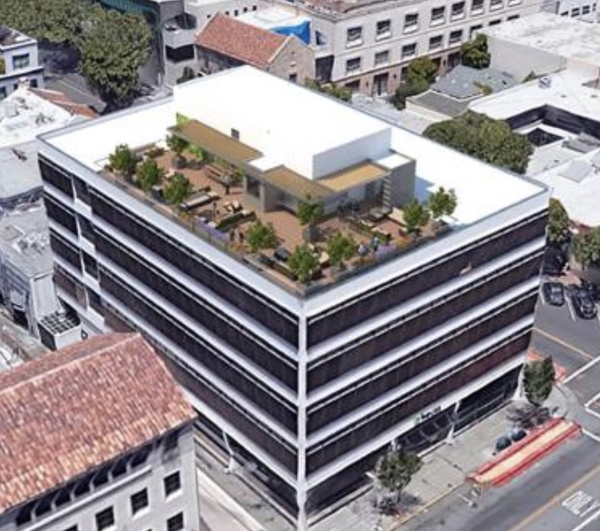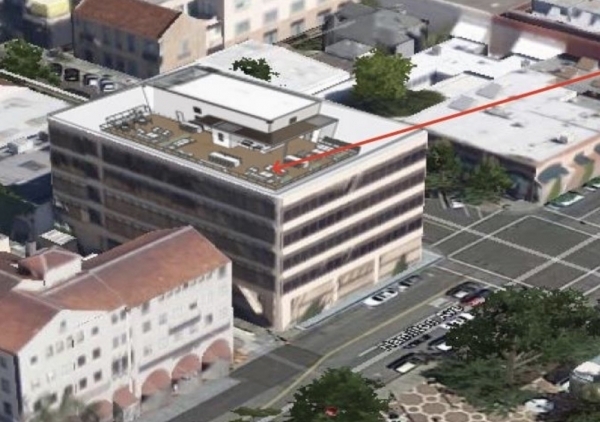Seeking to encourage more roof decks, patios and gardens in the downtown area, Palo Alto officials are preparing to relax the zoning rules for some of the area's tallest buildings.
The City Council is scheduled to consider on Monday a proposal from Houzz, the occupant of the commercial building at 285 Hamilton Ave., for a 2,600-square-foot roof deck. In doing so, the council will also consider changing the zoning code so that downtown's other "grandfathered" buildings, which fail to meet the zoning code, can also add decks.
The Houzz project has been going through the city's planning process for well over a year. In November 2017, the council discussed and cautiously supported the proposed roof deck addition. Even so, it prompted concerns among some council members — chiefly, Karen Holman and Lydia Kou — about the potential noise and privacy impacts of these additions.
Despite these concerns, the project now appears to have some momentum. The Planning and Transportation Commission voted in November to recommend approval of the roof deck proposal. The council, for its part, has been revising other portions of the zoning code in recent months to both encourage more housing and relax prior limits on commercial development.
In late January, the council revised zoning rules to allow new downtown residential developments to meet their open-space requirements by installing roof decks. And last week, as the council moved to eliminate a long-standing cap on new non-residential development in downtown, several council members talked about their desire to see more vitality and change in the area.
During the Feb. 11 discussion, Vice Mayor Adrian Fine called downtown "the best, least impactful place for future office growth." The majority of the planning commission expressed a similar sentiment in October, when the commission voted 4-2 to allow roof decks on grandfathered buildings.
John Shenk, representing Thoits Brothers, the building owner, made the case for relaxing the zoning rules by pointing to commercial buildings that have roof decks. These include the new development at 500 University Ave., which Shenk said has a "substantial rooftop deck" that has been getting significant use and that had not received a single complaint from neighbors or the general public.
While some critics contended that noise from the rooftop decks will disturb nearby residents, Shenk argued that the "vibrancy of the roof deck is wholly compatible with such environments and it's something we want to have."
Planning Commissioner Michael Alcheck agreed and led the majority in supporting the Houzz proposal, which would apply to seven "grandfathered" buildings in the downtown area, all of which have heights of 50 feet or more.
"I don't want to be the planning commissioner in sunny California that doesn't embrace the notion of roof decks," Alcheck said at the October meeting. "I think the notion that they are somehow incompatible with residential is baseless."
While Houzz is likely to get the city's approval, it's not clear how broadly the new rules would apply. In a new report from the Department of Planning and Community Environment, staff had proposed an option that would make roof decks even more accessible for downtown's commercial buildings. In addition to applying the new policy to the seven buildings that are taller than 50 feet, this option would also expand the criteria so that it also applies to all buildings that exceed density regulations.
The new policy would allow buildings that don't comply with height and gross floor area regulations to increase their height and floor area "to the minimum degree necessary" to provide rooftop access and amenities, including stairs, elevators, trellises, outdoor furniture, railings, lighting and other similar features. The rules would only apply to buildings that are located at least 150 feet from residential zones. Furthermore, requests would require a conditional use permit from the city.
The law would also limit the use of the roof decks to the building occupants and their employees. It would allow amplified music on roof decks but specify that such music not be audible beyond the property boundaries.




Comments
Registered user
Community Center
on Feb 21, 2019 at 9:29 am
Registered user
on Feb 21, 2019 at 9:29 am
I can guarantee than any amplified music will be audible beyond the property boundaries. Who are you kidding? We don't need more noise pollution in downtown PA.
Another Palo Alto neighborhood
on Feb 21, 2019 at 11:44 am
on Feb 21, 2019 at 11:44 am
On a recent trip to an overseas destination, I had lunch with another on a rooftop at a cafe. The ambience was pleasant, there was no music, just many people enjoying lunch, looking at the view and in particular the architecture of buildings nearby. However, it was a breezy day and many napkins and similar were caught by the breeze and blown off the rooftop.
Litter from these rooftops could well be a problem.
Crescent Park
on Feb 21, 2019 at 12:03 pm
on Feb 21, 2019 at 12:03 pm
Oh goody! You will also be provided with a free drone to make it even easier to invade the privacy of others.
Registered user
Downtown North
on Feb 21, 2019 at 1:07 pm
Registered user
on Feb 21, 2019 at 1:07 pm
I always find it odd that people choose to live downtown (or near it), and then object to many of the things that come with living downtown.
Downtown North
on Apr 27, 2019 at 10:10 pm
on Apr 27, 2019 at 10:10 pm
With the beautiful weather that we have all year round compared to other cities, along with m a vibrant, elite, international university crowd why must Palo Alto be such a sleepy town? On top of it all, we boast innovation and creativity. Let’s bring some life to Palo Alto. A rooftop with some nice lounge music on a sunny warm afternoon would be incredibly pleasant. Great for business meetings and networking too. Equinox in San Mateo is currently the only place in the entire area that has a vibrant yet relaxing feel - by its outdoor pool. While it’s great that some of us at least have that option, it is pretty sad, in my opinion, that it’s the only place of retreat on a rooftop in the entire area.